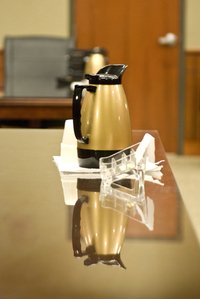 On Friday, Illinois Governor, Bruce Rauner, signed a new bill into law which takes affirmative steps to try to solve the bail problem in Illinois. The bill, called the Bail Reform Act, makes some significant changes to the bail process in Illinois and seeks to deal with the problems faced by people who are charged with minor crimes who are stuck in jail because they are unable to come up with the low amount of cash to post bail so they can be released.
On Friday, Illinois Governor, Bruce Rauner, signed a new bill into law which takes affirmative steps to try to solve the bail problem in Illinois. The bill, called the Bail Reform Act, makes some significant changes to the bail process in Illinois and seeks to deal with the problems faced by people who are charged with minor crimes who are stuck in jail because they are unable to come up with the low amount of cash to post bail so they can be released.
I recently posted an article about a 60 Minutes episode which points out the numerous problems with Cook County Jail. In that article, I pointed out that last year, over a thousand people spent more time in Cook County Jail than what they were eventually sentenced to by the court. What was most disturbing is that just as many people spent over 222 years more than what they were eventually sentenced to. The main reason behind this was that non-violent offenders, who were charged with minor crimes, were not able to come up with the low amounts of cash needed to post the bail needed to get out of jail. As a result, they were stuck in Cook County Jail until their case was finished.
Tom Dart, the Cook County Sheriff, the man who is in charge of running the day-to-day operations of Cook County Jail, has long been an advocate for reforming the Bail process. He has been pushing the Illinois Legislature for a number of years, to address the Bail process so that this injustice of forcing people who are poor to sit in jail for many months just because they are poor. I pointed out in this article that the Illinois Legislature is working on steps to try to deal with this problem.
 Chicago Criminal Lawyer Blog
Chicago Criminal Lawyer Blog











 Retail Theft, commonly known as Shoplifting, is a very serious crime in Illinois. In addition to the criminal penalties associated with a Retail Theft case, a prospective employer that finds a Retail Theft case in a background search could use it against you to deny you employment. Some employers conduct background searches. If your current employer finds out about a Retail Theft arrest, your employer may fire you. If you try to lease an apartment and a landlord conducts a background search, that landlord may turn down your lease application.
Retail Theft, commonly known as Shoplifting, is a very serious crime in Illinois. In addition to the criminal penalties associated with a Retail Theft case, a prospective employer that finds a Retail Theft case in a background search could use it against you to deny you employment. Some employers conduct background searches. If your current employer finds out about a Retail Theft arrest, your employer may fire you. If you try to lease an apartment and a landlord conducts a background search, that landlord may turn down your lease application. Over the weekend I read an article about a 60 minutes episode about Cook County Jail and Sheriff Tom Dart. Cook County Sheriff Tom Dart is in charge of running Cook County Jail, the largest single-site jail in the United States. After I finished reading the article, I was struck by some of the information contained in the article and wanted to pass along some of the things that I learned. We are used to seeing news stories about inmates who are released from prison after spending years behind bars for a crime they did not commit. We become conditioned to believe that this is all that is wrong with our criminal justice system. But this article about Cook County jail is much more disturbing because it represents a systematic injustice, legal and moral, with our criminal justice system.
Over the weekend I read an article about a 60 minutes episode about Cook County Jail and Sheriff Tom Dart. Cook County Sheriff Tom Dart is in charge of running Cook County Jail, the largest single-site jail in the United States. After I finished reading the article, I was struck by some of the information contained in the article and wanted to pass along some of the things that I learned. We are used to seeing news stories about inmates who are released from prison after spending years behind bars for a crime they did not commit. We become conditioned to believe that this is all that is wrong with our criminal justice system. But this article about Cook County jail is much more disturbing because it represents a systematic injustice, legal and moral, with our criminal justice system. The main difference between a Civil Order of Protection and a Criminal Order of Protection has to do with how the person who is seeking the Order of Protection goes about getting the Order of Protection entered, or issued. An Order of Protection is a court order which bars someone from having at least some contact with another person. The typical Order of Protection forbids a person from being anywhere near another person or forbids them from being at a certain location or attempting to make any contact whatsoever with the other person. It’s really the only way that the legal system can offer protection from bodily harm from another person. It’s a piece of paper that has no power in and of itself to prevent anything from happening. The only thing that the Order of Protection does is allow the police to arrest someone if they are found to be in Violation of the Order of Protection.
The main difference between a Civil Order of Protection and a Criminal Order of Protection has to do with how the person who is seeking the Order of Protection goes about getting the Order of Protection entered, or issued. An Order of Protection is a court order which bars someone from having at least some contact with another person. The typical Order of Protection forbids a person from being anywhere near another person or forbids them from being at a certain location or attempting to make any contact whatsoever with the other person. It’s really the only way that the legal system can offer protection from bodily harm from another person. It’s a piece of paper that has no power in and of itself to prevent anything from happening. The only thing that the Order of Protection does is allow the police to arrest someone if they are found to be in Violation of the Order of Protection. Last week I had a trial for a Domestic Battery at the Bridgeview Courthouse in Cook County. My client had no criminal record whatsoever. He had been charged with committing a Domestic Battery on an ex-girlfriend (victim) during a consensual sexual encounter. The facts of the case were very strange. At no time did I think that my client was guilty of the Domestic Battery. As a matter of fact, I tried to alert the prosecutor to the weakness of their case and tried to get them to drop the case rather than force their witness to take the stand and be exposed to a potentially damaging cross examination. Let me tell you about the facts of the case and how easy it is to get caught up in something that you had no idea could possibly become a criminal matter.
Last week I had a trial for a Domestic Battery at the Bridgeview Courthouse in Cook County. My client had no criminal record whatsoever. He had been charged with committing a Domestic Battery on an ex-girlfriend (victim) during a consensual sexual encounter. The facts of the case were very strange. At no time did I think that my client was guilty of the Domestic Battery. As a matter of fact, I tried to alert the prosecutor to the weakness of their case and tried to get them to drop the case rather than force their witness to take the stand and be exposed to a potentially damaging cross examination. Let me tell you about the facts of the case and how easy it is to get caught up in something that you had no idea could possibly become a criminal matter. Many of the people that I have represented in my 27 years of being a criminal defense lawyer have no criminal record and have little, or no experience, with the criminal justice system. For many people, the thought of facing criminal charges can be a daunting and scary experience. In addition to providing legal services in court, one of my main responsibilities as a criminal defense lawyer is to explain the legal process to my clients and to make sure they fully understand what is happening, and what will be happening in the future.
Many of the people that I have represented in my 27 years of being a criminal defense lawyer have no criminal record and have little, or no experience, with the criminal justice system. For many people, the thought of facing criminal charges can be a daunting and scary experience. In addition to providing legal services in court, one of my main responsibilities as a criminal defense lawyer is to explain the legal process to my clients and to make sure they fully understand what is happening, and what will be happening in the future. Illinois has some very strict laws, rules, and regulations involving DUI’s. I frequently get questions from clients asking about whether they should or should not take a breathalyzer when they are requested to by a police officer. There is no simple yes or no answer to that question. Whether someone who has been stopped for a DUI should submit to a breathalyzer test or not is a very complicated question that depends on each case and the specific facts surrounding each case. All I can do is explain what the legal consequences of a refusal to submit to a breathalyzer test would be and what could happen if you take a breathalyzer test and you fail that test.
Illinois has some very strict laws, rules, and regulations involving DUI’s. I frequently get questions from clients asking about whether they should or should not take a breathalyzer when they are requested to by a police officer. There is no simple yes or no answer to that question. Whether someone who has been stopped for a DUI should submit to a breathalyzer test or not is a very complicated question that depends on each case and the specific facts surrounding each case. All I can do is explain what the legal consequences of a refusal to submit to a breathalyzer test would be and what could happen if you take a breathalyzer test and you fail that test. Just like State laws create State crimes, and Federal laws create Federal crimes, individual towns, cities and villages also create laws, called Municipal Ordinances, which can give rise to charges alleging a violation of a Municipal Ordinance. I’ve been handling criminal cases for the past 27 years throughout Cook County, DuPage County, Kane County, and Lake County. I’ve noticed a dramatic rise in the number of Municipal Ordinance Violation cases throughout all of these counties. Many cities, towns and villages have established their own Municipal Violation Ordinance Courts which mainly impose monetary civil penalties upon violators that have become big sources of revenue for these municipalities. I’m seeing more and more cases being charged as Municipal Ordinance Violations rather than criminal cases in Circuit Court. This is especially true in Chicago, DuPage County, Kane County, and Lake County. I see the number of Municipal Ordinanve Violation cases increasing in the future
Just like State laws create State crimes, and Federal laws create Federal crimes, individual towns, cities and villages also create laws, called Municipal Ordinances, which can give rise to charges alleging a violation of a Municipal Ordinance. I’ve been handling criminal cases for the past 27 years throughout Cook County, DuPage County, Kane County, and Lake County. I’ve noticed a dramatic rise in the number of Municipal Ordinance Violation cases throughout all of these counties. Many cities, towns and villages have established their own Municipal Violation Ordinance Courts which mainly impose monetary civil penalties upon violators that have become big sources of revenue for these municipalities. I’m seeing more and more cases being charged as Municipal Ordinance Violations rather than criminal cases in Circuit Court. This is especially true in Chicago, DuPage County, Kane County, and Lake County. I see the number of Municipal Ordinanve Violation cases increasing in the future
 This question cannot be answered with a simple yes or no answer. Unfortunately, the Illinois Unlawful Use of a Weapon (UUW) statute is a little complicated and requires an explanation. Another question I frequently get asked is: How do I legally transport a handgun in Illinois? Here it goes.
This question cannot be answered with a simple yes or no answer. Unfortunately, the Illinois Unlawful Use of a Weapon (UUW) statute is a little complicated and requires an explanation. Another question I frequently get asked is: How do I legally transport a handgun in Illinois? Here it goes.